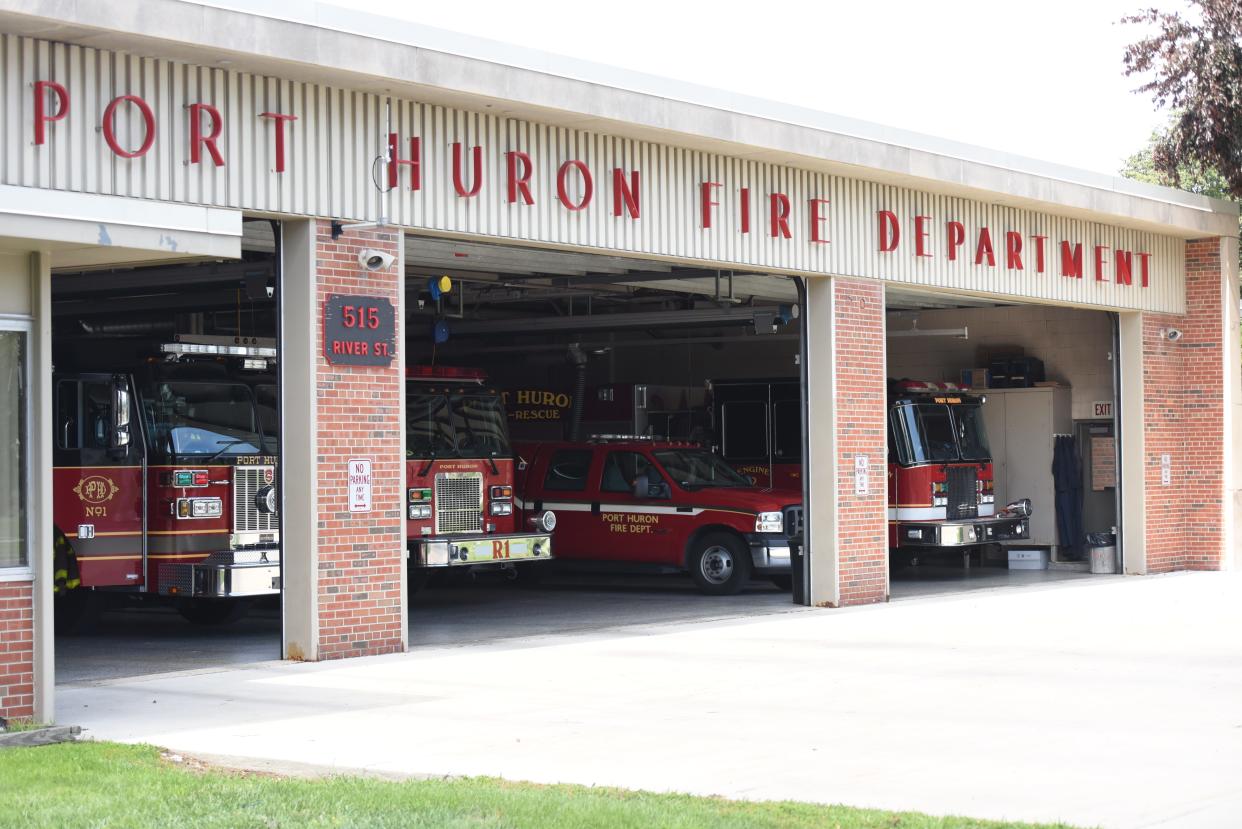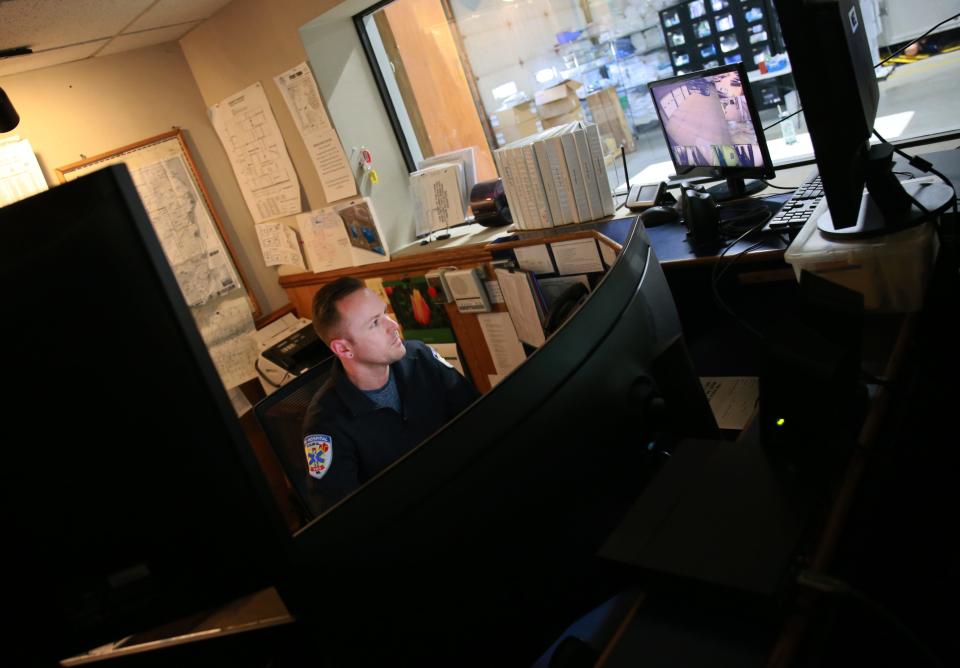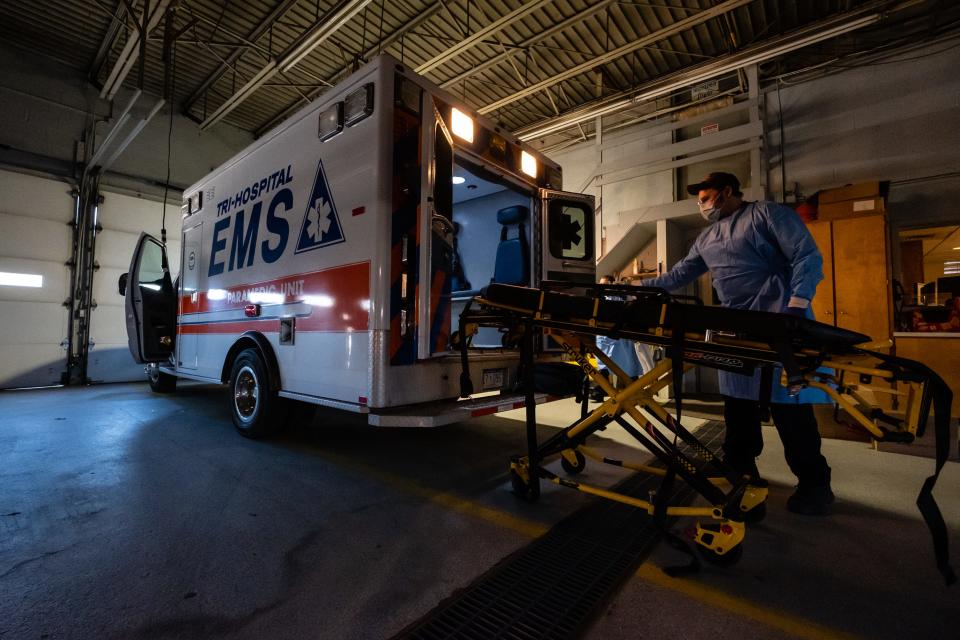Some fire departments are responding to fewer medical calls, here's why

The next time you call 911 to report a medical emergency, it's less likely a firefighter will join EMS responders.
A new protocol adopted by several St. Clair County fire departments has changed how they coordinate with Tri-Hospital Emergency Medical Services to respond to medical calls.
With a few exceptions, fire departments will only respond to medical incidents classified as protocol Delta or protocol Echo, the most serious and life-threatening medical incidents.
The change in emergency response was made to reduce the risk that firefighters will all be tied up in non-emergency calls in the event of a structure fire or other major incident only the fire department could address.
When will you see the fire department respond to your medical emergency?
Previously, both firefighters and Tri-Hospital EMS would respond to calls classified as Bravo and Charlie, the mid-level classification of calls, as well as Delta and Echo. Now, firefighters will no longer respond to those mid-level, non-emergency calls.
Exceptions will be made if it would take more than eight minutes to respond to the emergency.
Tri-Hospital EMS will still respond to all medical calls they receive, according to Ken Cummings, the CEO. The policy change applies only to firefighters.
The St. Clair County Medical Control Authority adopted the new policy in February after receiving a unanimous endorsement from county fire department chiefs and a draft of the recommended changes. The policy change officially took effect in April.

The recommendation to change the policy came after the county fire departments and the Medical Control Authority conducted a study to learn how to reduce the number of responses by firefighters.
In recent years firefighters and other emergency responders have seen staffing decreases. Fire departments have seen less applications in new job postings even as the number of calls increases each year, so local fire chiefs looked for ways to reduce non-serious calls to make sure a team is always available in case of a fire.
Port Huron Township Fire Department Chief Andrew Persig endorsed the change in a presentation to Port Huron Township officials at a July 17 meeting.
“Responding to non-emergency incidents ties up fire personnel and makes them unavailable during an incident where firefighters are actually needed,” Persig wrote in a presentation.
Sixteen of St. Clair County’s fire departments have accepted this change. Six, however, have adopted an alternate policy of responding to every single medical call, regardless of the classification. Those include Kimball Township, Algonac Fire Department, Grant Township Fire Department, Greenwood Township Fire Department, Ira Township Fire Department and Kenockee Township Fire Department.

Cummings, who is a member of the Medical Control Authority, said firefighters who went to Bravo and Charlie calls sometimes had little to do to help emergency medical technicians on a call.
“There were times where all they would do is hold open the door,” Cummings said. “Clearly, that’s an unnecessary use of resources.”
Port Huron Fire Department Chief Corey Nicholson said the change has helped free up firefighters for overlapping medical calls.
“We increasingly saw our EMS call volume growing, and we increasingly notice what would be considered a non-emergency medical request being dispatched as an emergency medical response,” Nicholson said.
According to Nicholson, several “medical emergencies” turn out to be less serious than indicated by the caller. According to Cummings, only 6% of hot calls, or calls requiring lights and sirens, result in someone being transported to a hospital.
“We noticed in those Bravo and Charlie type call determinants, there were a lot of non-emergency medicals being dispatched,” Nicholson said.
Nicholson said the Port Huron Fire Department has three companies of firefighters ready to respond at any given time. There had been times when all three were responding to medical incidents, which meant none were available if a structure fire was reported.
Since the new policy went into effect, Port Huron Fire Department has seen the number of medical calls it responds to nearly cut in half.
Between April 1 and July 31 of 2022, the fire department responded to 1,040 medical calls, according to Nicholson. During the same time period in 2023 it responded to only 588 medical calls.
Port Huron Township Fire Department saw similar declines. Data included in Presig’s presentation shows the department went from 232 medical calls from April through July of 2022 to 125 calls during the same period in 2023.
For the six fire departments that are opting out of the policy change on Bravo and Charlie calls, the Medical Control Authority offered an alternative option to be called to respond to every medical call.
It’s an all-or-nothing option. Cummings said St. Clair County Central Dispatch wouldn’t be able to keep track of custom response policies for each department in the county, so those departments will not only continue to be called for Bravo and Charlie incidents, but even Omega and Alpha responses.
The 2022 study that preceded the new medical response policy was focused on Port Huron, Port Huron Township, St. Clair and Marine City.
“I know Port Huron and Port Huron Township get a lot of heat for this protocol,” Persig said. “But there’s way more agencies following this. It does show a bigger impact in the township and in the city just because we have a higher population.”
Though all fire chiefs in the county endorsed the policy change when it was proposed to the St. Clair County Medical Control Authority, Cummings said the authority later received a comment from Kimball Township Fire Department opposing the change.
Kimball Township Fire Department declined to comment for this story.
Bill Click, chief of Kenockee Township Fire Department, said his township responded to all calls even before the new policy was proposed. He said the Kenockee Township chose to respond to all calls to ensure someone responded to each call as quickly as possible, regardless of how serious it seemed at first.
How are calls dispatched?
When a person calls 911 to report a medical emergency, St. Clair County Central Dispatch asks a series of questions to determine what protocol the response should follow based on the seriousness of the emergency and who should respond to it.
The Medical Priority Dispatch System, a standardized dispatch response system used by dispatch offices nationwide that covers everything from hiccups to drownings, uses a card system to tell the dispatcher what questions to ask a caller until they can categorize a call.
The lowest level protocols, Omega and Alpha, are considered “cold” protocols because they are not serious enough to warrant the use of sirens when responding.
Omega is the lowest priority and includes minor illnesses and injuries.
Alpha calls are slightly more serious, though not by much, and includes slightly more serious injuries.
Bravo is the next level, serious enough to be a “hot” call where first responders will use sirens. Serious injuries that are not urgent fall under this category and can include injuries from weapons or accidents where the victim is breathing normally and alert.
Charlie protocol is used over Bravo if the patient is not breathing normally. Other calls in this category may include drug overdoses where the person is still conscious.
Delta protocol, the first of two protocols for life-threatening situations, is for cases involving a patient who is unconscious, who is still in danger and may need a specialized rescue, and patients who were recently resuscitated.
Protocol Echo, the most serious category, is used only for patients who have stopped breathing and/or have had a heart attack.
A seventh category, called incomplete emergency medical dispatch, refers to cases where the state of the patient is unknown, such as if a medical device alerts responders, but the patient doesn’t respond.
Though these protocols are used by dispatch centers nationwide, medical control authority boards in each county in Michigan coordinate policies on how to respond to those calls.
The St. Clair County Medical Control Authority includes medical professionals from local hospitals, EMTs, and other first responders.
Cummings said the Medical Control Authority has not received any complaints since the policy changed.
The Medical Control Authority does not have plans to review the new response policy, according to Cummings. He said any reconsideration would depend on the board receiving a recommendation similar to the one which led to the policy change.
Contact Johnathan Hogan at jhogan@gannett.com. Jackie Smith contributed to this report.
This article originally appeared on Port Huron Times Herald: Local fire departments are responding less to non-emergency medical calls

